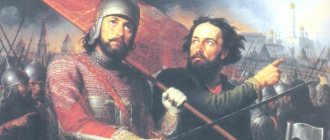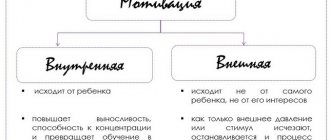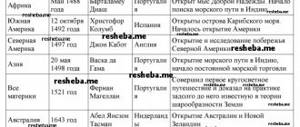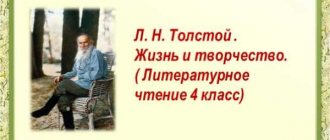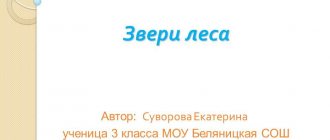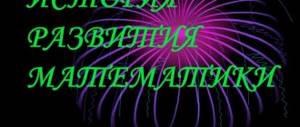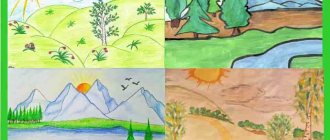Literature lesson notes for grade 6 “V. P. Astafiev “Belogrudka”
Topic: V.P. Astafiev "BELOGRUDKA"
Goal: immersing myself in the creative laboratory of V.P. Astafiev, try to understand the author's intention.
Tasks:
1.Develop the ability to analyze an epic work;
2. Foster a caring attitude towards the environment
- Org. moment.
- Inductor. Read the word on the slide (WHITE CHEST). Let's work with this word. Place a piece of paper in front of you and write down what creature or what can be called that. (bird, duck, swan, squirrel, flower). Next to it, write down the words that would characterize this creature (with a white chest, soft, fluffy, small, cheerful, dexterous, brave, kind, mischievous.)
- Read what you wrote one by one. Write down your favorite word. Try not to repeat yourself. (Only those who wish to read.)
— Would you like to know who Belogrudka is?
Then I will read to you the beginning of the story by Viktor Petrovich Astafiev, which is called “Belogrudka. (The story is read by the teacher until the words: “Then there was a terrible day when Belogrudka ...<>.)
— I didn’t read the story completely, continue it. How did the boys react to the hunter's advice? Write your options for further events.
(5 minutes are given for individual work. Each of the children sees his
option for the development of further events, he mentally experiences this situation himself.)
- Please read what was swelling in your head. (Those who wish can read.)
There were different options for continuing the story, but they were united by the desire for a humane conclusion to the events:
-And now I will read the continuation of Astafiev’s story. (I read to the words: “... thinking that she will not appear in Zuyaty again.”)
- Choose the most accurate words that could become the title of this part (second part). Write on the cards in large font using a felt-tip pen.
(Based on their experiences and impressions, each child writes the most significant word for themselves.)
Title cards are attached to a magnetic board.
— Go to the board and read the titles chosen by your comrades. You need to choose the most accurate name for this part. On the other side of your paper, write down the title that you think best suits this part of the story. (“Orphan, “Belogrudka became orphaned, <
�������������������������������������������������������������������������������������������������������������������������������
�������������������������������������������������������������������������������������������������������������������
���������������������������������������������
Because of the events, children seem to become participants in what is happening.)
- Read what you wrote. How would you end the story?
- Now express in color the feelings you experienced at the end of your story.
Leaflets with the designated color are attached to one side of the board. The predominant colors are: blue, gray, brown, dark green, red, orange, yellow, blue.
-And now I will read you the author’s conclusion to this story. (I read the story to the end.)
- Now convey, using color, the feelings that you experienced after listening to the end of Astafiev’s story.
(These leaves are attached to the other side of the board.) The predominant colors are: black, red, gray, dark brown, some yellow, green.
— Explain why you chose this particular color.
— Black color means the death of Belogrudka and her children;
- red - blood, death;
- yellow, green - no matter how much evil people do, nature is beautiful. We are part of nature, and we need to protect it.
This or that color chosen by the children clearly demonstrates their protest against violence and cruelty. In all works there is a call for caring for nature, for our smaller brothers. The desire for justice, goodness, and harmony of man with all living things is expressed.
Let's look at the epigraph of the lesson:
— Is he suitable for our lesson? How did you understand it?..
What is experienced and expressed during the workshop lesson becomes the child’s personal position.
Let's finish the lesson:
— What types of work did you like during the workshop and why?
- What discovery did you make for yourself today?
—What moral experience have you acquired?..
TEXT
V.P. Astafiev "BELOGRUDKA"
The village of Vereino is located on a mountain. There are two lakes under the mountain, and on their shores, an echo of a large village, there is a small village of three houses - Zuyata.
Between Zuyatami and Vereino there is a huge steep slope, visible many dozens of miles away as a dark humpbacked island. This whole slope is so overgrown with dense forest that people almost never go there. And how do you get around? As soon as you take a few steps away from the clover field, which is on the mountain, you will immediately roll head over heels down, falling crosswise into the lying dead wood, covered with moss, elderberry and raspberries.
It’s quiet on the slope, damp and twilight. Spruce and fir support reliably bury their inhabitants - birds, badgers, squirrels, stoats - from evil eyes and raking hands. The hazel grouse and capercaillie live here, very cunning and cautious.
And one day, perhaps one of the most secretive animals - the white-breasted marten - settled in the thicket of the slope. She lived alone for two or three summers. Occasionally appearing at the edge of the forest, Belogrudka twitched her sensitive nostrils, caught the nasty smells of the village and, if a person approached, pierced like a bullet into the wilderness of the forest.
In the third or fourth summer, Belogrudka gave birth to kittens, small as bean pods. The mother warmed them with her body, licked each one until it was shiny, and when the kittens grew a little older, she began to get food for them. She knew this slope very well. In addition, she was a diligent mother and provided the kittens with plenty of food.
But somehow Belogrudka was tracked down by the Vereinsky boys, followed her down the slope, and hid. The belogrudka meandered through the forest for a long time, waving from tree to tree, then decided that the people had already left - they often pass by the slope - and returned to the nest.
Several human eyes were watching her. Belogrudka did not feel them, because she was all trembling, clinging to the kittens, and could not pay attention to anything. The white-breasted licked each of the cubs on the muzzle: they say, I will now, in an instant, fly out of the nest.
It became more and more difficult to obtain food day by day. He was no longer near the nest, and the marten went from tree to tree, from fir to fir. To the lakes, then to the swamp, to the big swamp, beyond the lake. There she attacked a simple jay and, joyful, rushed to her nest, carrying in her teeth a red bird with a loose blue wing.
The nest was empty. The white-breasted bird dropped its prey from its teeth, darted up the spruce tree, then down, then up again, to the nest, cunningly hidden in the thick spruce branches.
There were no kittens. If Belogrudka could scream, she would scream. The kittens are gone, gone.
Belogrudka examined everything in order and discovered that people were trampling around the spruce tree, and a man was awkwardly climbing the tree, tearing off the bark, breaking off twigs, leaving a reeking smell of sweat and dirt in the folds of the bark.
By evening, Belogrudka definitely tracked down that her cubs were taken to the village. At night she found the house to which they were taken.
Until dawn she rushed around the house: from the roof to the fence, from the fence to the roof. For hours I sat on the bird cherry tree, under the window, listening to the kittens squeak.
But in the yard a chain rattled and a dog barked hoarsely. The owner came out of the house several times, shouting angrily at her. The whitebreast was huddled in a lump on the bird cherry tree.
Now every night she sneaked up to the house, watched, watched, and the dog rattled and raged in the yard.
One day Belogrudka crept into the hayloft and stayed there until daylight, but during the day she did not dare to go into the forest. That afternoon she saw her kittens. The boy took them out to the porch in an old hat and began to play with them, turning them upside down and flicking them on the nose. More boys came and began to feed the kittens raw meat. Then the owner appeared and, pointing to the kunyat, said:
- Why are you torturing animals? Take it to the nest. They will disappear.
Then there was that terrible day when Belogrudka again hid in the barn and again waited for the boys. They appeared on the porch and argued about something. One of them brought out an old hat and looked into it.
- Eh, I died alone.
The boy took the kitten by the paw and threw it to the dog. A fold-eared yard dog, who had been chained all his life and was accustomed to eating whatever was given, sniffed the kitten, turned it with his paw and began to leisurely devour it from the head.
That same night, many chickens and hens were strangled in the village, and an old dog was strangled to death on a high dam after eating a kitten. Belogrudka ran along the fence and teased the mongrel so much that she rushed after her, jumped over the fence, fell off and hung.
Ducklings and goslings were found strangled in vegetable gardens and on the street. In the outermost houses, which are closer to the forest, the bird has completely hatched.
And for a long time people could not find out who was robbing the village at night. But Belogrudka became completely furious and began to appear at houses even during the day and deal with everything that was within her power. The women groaned, the old women crossed themselves, the men swore.
- It's Satan! They called for an attack!
Belogrudka was waylaid and shot down from a poplar tree near the old church. But Belogrudka did not die. Only two pellets got under her skin, and she hid in the nest for several days, licking her wounds.
When she cured herself, she again came to that house, where she seemed to be dragged on a leash.
Belogrudka did not yet know that the boy who took the baby birds was flogged with a belt and ordered to take them back to the nest. But the carefree boy was too lazy to climb into the forest support, threw the coonlets in a ravine near the forest and left. Here they were found and killed by a fox.
Belogrudka was orphaned. She began to recklessly crush pigeons and ducklings not only on the mountain, in Vereino, but also in Zuyaty.
She was caught in the cellar. Having opened the cellar trap, the owner of the last hut in Zuyaty saw Belogrudka.
- So there you are, Satan! - She clasped her hands and rushed to catch the marten. All the cans, jars and cups were knocked over and beaten before the woman grabbed the marten.
Belogrudka was imprisoned in a box. She gnawed the boards savagely, crumbling wood chips.
The owner came. He was a hunter. And when his wife told me that she had caught a marten, he said:
- Well, in vain. It is not her fault. She was offended and orphaned. - And he released the marten into the wild, thinking that it would not appear in Zuyaty again.
But Belogrudka began to rob even more than before. The hunter had to kill the marten long before the season.
In the garden near the greenhouses, he saw her one day, drove her onto a lonely bush and shot. The marten fell into the nettles and saw a dog running towards her with a wet, barking mouth. The white-breasted snake rose from the nettles, grabbed the dog’s throat and died.
The dog rolled around in the nettles, howling wildly. The hunter unclenched Belogrudka's teeth with a knife and broke two piercingly sharp fangs.
Belogrudka is still remembered in Vereino and Zuyatakh. Until now, children here are strictly punished so that they do not dare touch baby animals and birds.
Squirrels, foxes, various birds and little animals now live and breed peacefully between two villages, close to housing, on a steep wooded slope. And when I am in this village and hear the deep-voiced morning hubbub of birds, I think the same thing: “If only there were more slopes like this near our villages and cities!”
